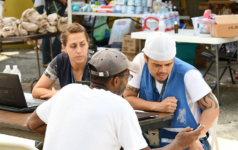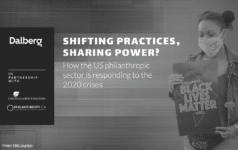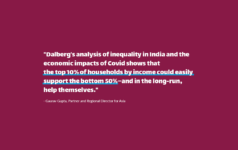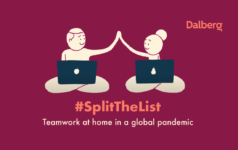Dalberg uses cookies and related technologies to improve the way the site functions. A cookie is a text file that is stored on your device. We use these text files for functionality such as to analyze our traffic or to personalize content. You can easily control how we use cookies on your device by adjusting the settings below, and you may also change those settings at any time by visiting our privacy policy page.
Dalberg has been working to understand the issue of unpaid care work for over three years, partnering with organizations like the Bill & Melinda Gates Foundation – which has a strategic focus on women’s economic empowerment in their gender equality strategy – to understand the issue and design strategies for change.
Here, Dalberg interviews Keiko Valente, Associate Program Officer on the Bill & Melinda Gates Foundation’s Gender Equality Team. Keiko talks about her takeaways from the Bill & Melinda Gates Foundation’s work with Dalberg on unpaid care work, and how she’s helping to advance gender equality through her role.
Tell us about yourself and how you advance gender equality at the Bill & Melinda Gates Foundation
I am an Associate Program Officer on the Bill & Melinda Gates Foundation’s Gender Equality team. I contribute to many of the Gender Equality team’s workstreams, including evidence building on what works to advance women’s economic empowerment, which includes alleviation of unpaid care work.
What were your biggest takeaways from Dalberg’s research and analysis for the Bill & Melinda Gates Foundation on unpaid care work?
1. That the time spent on unpaid care work has remained roughly unchanged over the past 40 years, despite the ubiquity of unpaid care work, and notwithstanding its impact on men’s and women’s lives.
2. That, on average, women spend about 7 years more time on unpaid care work than men during their lifetime – I was truly struck by this quantification, which made me ponder the overall effect that increased unpaid care work can have on women’s lives.
3. That when proposing ways to recognize, reduce, and redistribute the burden of unpaid care work, we must take the dignity and protection of domestic workers into account.
What do you wish people knew about unpaid care work, but may not yet be aware of?
I wish people knew that the gendered nature of unpaid care work starts early. Traditional gender roles related to household chores for boys and girls shape the division of labor in the household, and these roles may continue on into adulthood. This is a contributing factor to the unequal burden of unpaid care work that women take on later in life.
What do you see as the key unanswered strategic questions that different actors (e.g., communities, corporations, foundations, non-profits) have to wrestle with as we seek to mitigate the heavy and unequal responsibilities of unpaid care work on women and girls?
The questions I am wrestling with relate to policy guidance. What are specific, clear policy guidelines that we can give to country governments to support them in:
1. Moving beyond the recognition of the burden of unpaid care work, and into reducing and redistributing it within and across the household
2. Responding to the increased care work needed for ageing populations
3. Shifting social norms around the expectation that girls and women take on an unequal burden of unpaid care work in the home
To read more about Dalberg’s perspectives on unpaid care work, read ‘It’s About Time: The case for valuing women and girls’ unpaid care work’, a Dalberg article that captures our ongoing analysis. Questions and comments can be directed to Shruthi Jayaram (shruthi.jayaram@dalberg.com) or Rachna Saxena (rachna.saxena@dalberg.com).
To learn more about the Bill & Melinda Gates Foundation’s work on women’s economic empowerment – which focuses on expanding women’s digital financial inclusion as well as women’s market inclusion, to ensure women can access markets, earn income, and make decisions about how to spend the money they make – and about women’s empowerment collectives to help women strengthen their voices, skills, and knowledge through digital technology and new partnerships, see the Equal is Greater website.

















